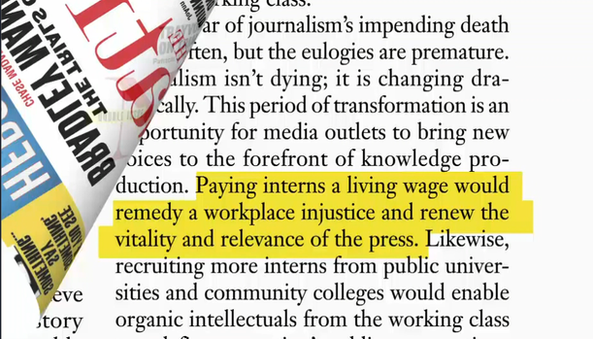The former interns battling to change the culture of US work
- Published
Lucy Bickerton sued a company that she interned with - and won
The time-honoured tradition of the unpaid internship is increasingly coming under attack in the US, as former interns sue - and increasingly win cases against - the companies that allowed them to work for free.
Before Lucy Bickerton started studying to be a doctor she wanted to produce films.
However, her first taste of the business - a four month internship, working long hours and getting paid nothing on the current affairs programme The Charlie Rose Show - left her questioning her career choice.
"While I was doing my internship, it didn't really occur to me that I was really doing the work of a production assistant and not this unpaid intern job, whatever that really means," says Ms Bickerton.
After hearing about a successful lawsuit brought former Fox Searchlight interns who worked on the film Black Swan, Ms Bickerton filed her own suit and won the wages she says she should have been paid in the first place.
Now, more than thirty lawsuits, external have been filed by former interns against big firms such as Sony and Universal, demanding back pay for what they say are just entry-level jobs by a different name.
"Young people are starting to realise that unpaid internships are not helpful to them and are casting a sceptical eye," says Ms Bickerton.
Growing discontent
While no one knows exactly how many young workers in the US engage in internships each year, Intern Bridge, a college consultancy, estimates place the figure at close to one million.
Although US internship offerings have always ranged from the paid to the unpaid, increasingly in recent years, as the number of unemployed youth has surged in the wake of the financial collapse, the balance has tipped to the unpaid.
The unemployment rate for young people between the ages of 20 and 24 is more than 12% - more than 5% higher than the national average.
Desperate to get a foot in the door, many young workers have agreed to work for free, hoping the experience will help them qualify for a proper job.

Back-breaking work: former interns on the film Black Swan have won a case against Fox Searchlight
That's meant that "internships have now become the gateway into the white collar workplace," argues Ross Perlin, author of Intern Nation: How to Earn Nothing and Learn Little in the Brave New Economy.
"They have become a generational right of passage, something that a majority of college students do, to the point that now we have normalized a culture of unpaid work."
Disingenuous use
And it's unpaid work that may not lead to any particular gains.
A study, external by the National Association of Colleges and Employers found that only 37% of unpaid interns who graduated college in 2013 were offered a job - not significantly better than those without internships, 32.5% of whom were offered jobs.
Paid interns fared much better, with more than 63% finding full time work after their work experience.
The dire job prospects have perhaps led in a small way to the growing backlash.
Erica van Rabenswaay worked as an unpaid intern for fashion designer Norma Karmali for three months, designing window displays and photographing items.
She was then offered a full-time job, but after a month she was laid off - and she later saw an job posting for the very same unpaid position she had held. She says the two jobs - intern and full-time worker - were the same.
"I thought if you agreed to an unpaid internship, it was up to you. I later learned the position I was in, it was illegal," says Ms Rabenswaay.
So she too sued, external and won a settlement, external.
"There is a certain amount of working for free that some people do just to get better, but after a certain point you're being taken advantage of," she says.
Hired and then fired
While US labour law has a strict set of standards governing the practice of unpaid internships, many observers and former interns say that the Department of Labor has not done a good job of ensuring those standards are enforced.
"It's been sort of a free-for-all up to this point," says Mr Perlin.
But attempts to better regulate the process has led to a backlash.
Condé Nast, publisher of Vogue and Vanity Fair, suspended its internship programme entirely, and interns at W magazine and the New Yorker sued.
There's also the fact that in certain industries, like media, publishing, and film, the practice has become entrenched, without any other alternatives for young people hoping to get a foot in the door.
"Internships have made the entry level job an endangered species," says Mr Perlin.

A group of Nation interns wrote an open letter to the magazine arguing in favour of a living wage
'Losing a generation'
That's why Katrina Vanden Heuvel, publisher of the prestigious Nation magazine, says it might be up to employers to lead the way.
Last year, a group of interns published an open letter in the magazine, demanding that the Nation Institute, a non-profit organisation that is responsible for intern salaries, pays them a minimum wage of $7.25 per hour instead of the $150 per week stipend they currently received.
"Paying interns a living wage would remedy workplace injustice and renew the vitality and relevance of the press," they argued, external.
Surprisingly, perhaps, Ms Heuvel and those in charge listened - and now, for the first time in close to 30 years, the current crop of Nation interns are getting paid a minimum wage.
"We felt that it was in the spirit of the times" to change, says Ms Heuvel, who says that rising youth unemployment rates in the US and abroad have led to the possibility of "losing a generation".
"We should be addressing the problem of young people," she says.